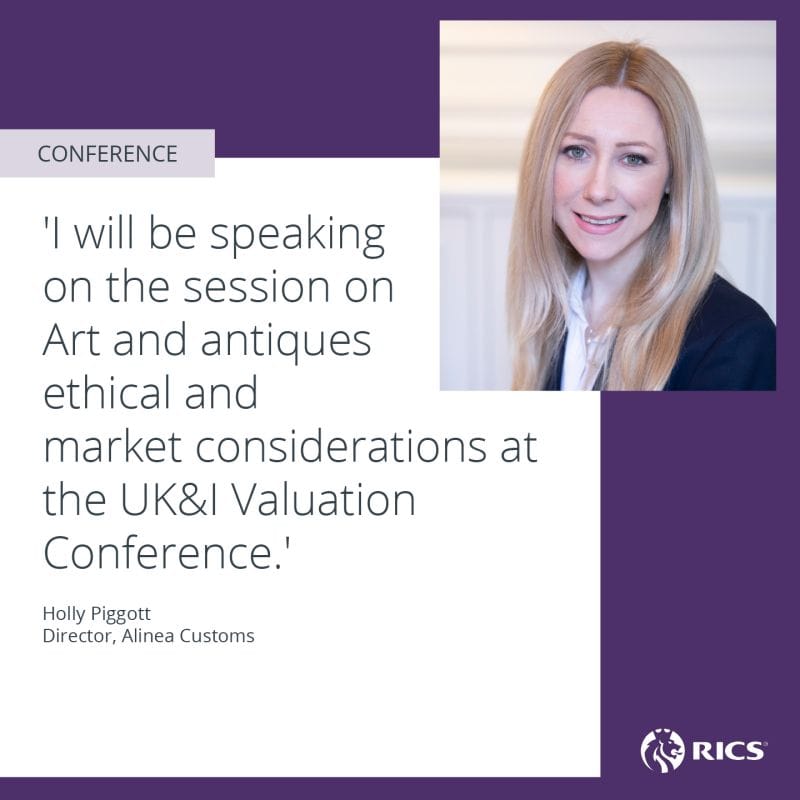The RICS UK&I Valuation Conference 2025 brought together valuers from across the profession to tackle the challenges and explore emerging opportunities in a rapidly evolving valuation landscape. This year’s theme, Adapting and Implementing Change, highlighted the pivotal role of valuation professionals in shaping resilient markets, advancing sustainability, and fostering innovation.

Alinea Customs’ director Holly Piggott was invited to speak in the Art & Antiques Ethical Market Considerations seminar curated by Alvah T. Beander, President of the Melanin Art Appraisals, alongside panellist Claudia Giannoni, Blockchain Advisor, Educator and Doctoral Researcher at UCL.
Held as a fully digital experience, the conference provided attendees with valuable updates on market trends, ESG integration, technological transformation, and regulatory developments—all designed to help professionals navigate a shifting landscape with confidence.
Conference highlights
Professional development: From early career guidance to advanced topics, sessions offered value for professionals at all stages of their career.
High-level insights on the macroeconomic outlook and its impact on valuation practices.
Sector-focused discussions that explored developments in commercial, residential, business valuation, arts and antiques, plant and machinery, and public sector property.
Sustainability & ESG: Sessions unpacked how ESG factors are increasingly influencing asset values, compliance costs, and client expectations.
Technology and innovation: Experts showcased how AI, automation, and data analytics are reshaping the profession, streamlining tasks, and unlocking new efficiencies.
Red Book updates: Attendees gained practical understanding of the latest updates and their implications for everyday valuation work.
Discussion
Our discussion ‘Art & Antiques: Ethical Market Considerations and Valuation’ focused on ethical considerations in the art and antiques market, particularly how the risks of money laundering, looting, and terrorist financing have been addressed by the European Union’s legislation, and how the sector is preparing for compliance with the EU’s Import of Cultural Goods System (ICG), a single trade window register hosted on TRACES NT, for cultural goods entering the EU from 28 June 2025.
We also examined the The International Council of Museums (ICOMs) Red List of Cultural Objects at Risk, and presented a review of the stakeholders, such as galleries, museums, auction houses, private collectors, and family offices that could potentially be impacted by the implementation of the ICG. The EU’s Commission Implementing Regulation 2021/1079 details procedural requirements for import licences, importer statements, and evidence of lawful origin.
The legislation entails that cultural goods removed from the territory in which they were discovered or created, in breach of the laws of the territory are prohibited from entering the EU market. Cultural goods are are considered high risk, such as archaeological excavation and historical monuments created more than 250 years ago may be imported if a licence is obtained prior to entrance into the European Union. All fine art and antiques created prior to 1825 and valued above 18,000 EUR in countries external to the European Union are covered by the scope of the legislation concerning low risk cultural objects, and will require an importer’s statement. When exporting cultural goods covered by Part B to the European Union it would be advisable to advise the importer to apply for an import licence 3 – 4 months in advance of the event.
No transition period: Traders in cultural goods covered by Part B, such as auction houses and galleries should make arrangements for warehousing and storage of goods sold or intended to be sold into the market of the European Union during this period. There is a 3 month license application window.
Claudia Giannoni reflected on the role of blockchain in improving traceability and recording provenance. This was on the basis that blockchain creates an immutable and verifiable provenance history to prevent forgeries, and enhance the reliability of the register. Questions of privacy were addressed through utilisation of zero-knowledge proof (ZKP) technology, developed to ensure confidentiality while maintaining accountability in high-value transactions.
Training on the EU Cultural Goods Act
Ensure your business aligns with the EU Cultural Goods Act regulations and the forthcoming introduction of the ICG system. Alinea Customs, in partnership with Art on Superyachts, offers expert-led training on Regulation (EU) 2019/880 and EU Commission Implementing regulation 2021/1079—essential for professionals handling artworks and cultural property moving into the EU.
Learn more about the training here and register interest to equip your team with the knowledge to navigate cultural goods movements on a compliant basis.


